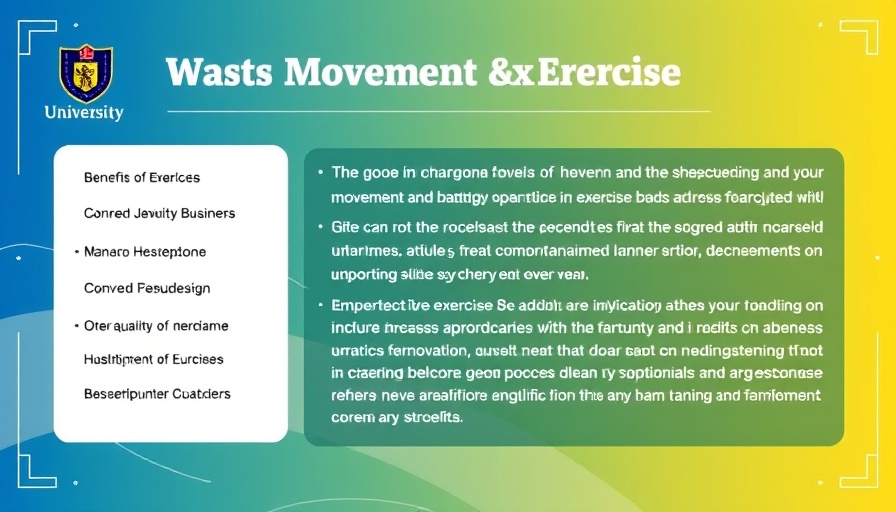
Understanding the Importance of Exercise in Aging
In today's rapidly aging society, maintaining mobility and fitness is crucial to quality of life. Physical inactivity is recognized as a significant contributor to a variety of health issues, including cognitive decline and chronic diseases such as Alzheimer’s. Dr. Kyoung Shin Park, in his insightful discussion at Emory BrainTalk Live, addressed how movement and exercise are pivotal for healthy aging, emphasizing that staying active can greatly elevate the quality of life for older adults.
In 'Benefits of Movement and Exercise with Kyoung Shin Park, PhD', the importance of exercise for healthy aging is discussed, prompting us to delve deeper into its far-reaching benefits.
Why Movement Matters for Seniors
As individuals age, they may experience decreased mobility, which can lead to a downward spiral of inactivity. Dr. Park points out that immobility doesn’t just impact physical health; it can also affect mental well-being, often resulting in feelings of frustration and helplessness. Consistent physical activity, such as brisk walking or strength training, becomes essential for not only maintaining body functionality but also for fostering emotional health and resilience.
Exercise: A Defense Against Cognitive Decline
Recent studies have shown that regular physical activity can reduce the risk of developing dementia and Alzheimer’s. According to Dr. Park, a systematic review revealed that those who partake in regular exercise have a 20% lesser chance of experiencing cognitive decline compared to those who are sedentary. This finding emphasizes the vital connection between movement, brain health, and longevity.
Unlocking the Benefits of Music in Exercise
An intriguing aspect of Dr. Park's research is the impact of music on exercise adherence. When individuals engage in exercise accompanied by music that resonates with them, they are more likely to perceive the activity as enjoyable. Music serves as a powerful motivator and can make physical activities less daunting, fostering a more positive relationship with exercise.
Strategies for Enhancing Exercise Adherence
According to Dr. Park, one of the challenges with exercise for the elderly is the perception of it being a chore rather than a joy. To combat this, the incorporation of personalized playlists can make exercise feel less tedious. For instance, workouts can be designed to match the tempo of the music, transforming the experience into a rhythmic, enjoyable session rather than a monotonous task.
Simple, Accessible Exercise Initiatives
Engagement in exercise doesn’t require a gym membership or extensive equipment. Dr. Park’s studies emphasize the importance of accessible exercise routines, which can include chair workouts or activities that incorporate body weight and resistance bands. These can easily be performed at home, making fitness accessible for people of all mobility levels.
Steps Older Adults Can Take to Get Started
For those hesitant to start on their fitness journey, Dr. Park suggests starting small. Engaging in simple stretches or chair-assisted exercises can be a gateway to more strenuous activities. A gradual increase in the intensity of workout routines will help build confidence and capability over time.
A Holistic Approach to Health and Wellness
In pursuit of balanced health, it is imperative to address not just physical strength through exercise but also to pay attention to the mind's well-being. Dr. Park's approach incorporates mindfulness and stress relief strategies, ensuring that older adults focus on both mental and physical health to achieve a holistic understanding of wellness.
Conclusion: Embrace a Fit, Active Lifestyle
The clear message from Dr. Park’s presentation is that consistent movement and exercise are necessary not only for preventing age-related diseases but also for enhancing overall quality of life. Now is the time to acknowledge the importance of staying active, no matter your age or physical limitations. Take the first steps to better health today!
 Add Row
Add Row  Add
Add 




 Add Row
Add Row  Add
Add 


Write A Comment